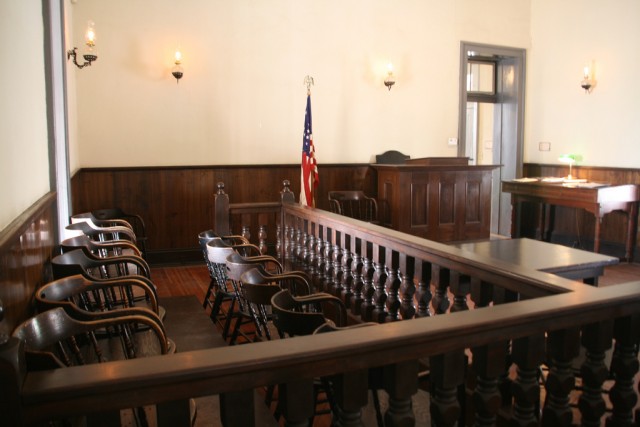
A few minutes after the Oracle v. Google verdict, the ten jurors filed out to the elevator. A group of several reporters, including me, had hunkered down close to the elevators to wait for the jury as they walked out. Several Oracle lawyers stood farther back, also eager to hear from the ten men and women who had dealt their side a major setback.
A court security guard, who had been outside the jury room throughout deliberations, walked the jurors straight to the elevator, saying the jurors didn't want to talk to anyone. That wasn't quite true. The foreman of the jury, Greg Thompson, stopped and answered reporters' questions for about twenty minutes, while Oracle lawyers listened quietly to his answers.
Thompson's brief chat with reporters revealed that the jury had a strong pro-Google bent during both the patent phase, which Google won, and the copyright phase, which ended with a split verdict.
Oracle—after spending millions litigating this case and dragging in some of the world's most famous tech CEOs to testify in a federal courtroom—had never even come close to winning.
Jurors split on copyright issues 9-3—in Google's favor
After the copyright verdict, there had been some speculation around the Web that because the jury found that Google infringed copyright—but split on fair use—it was basically a pro-Oracle jury with one or two holdouts sticking up for Google. Talking to Thompson, it quickly became clear that wasn't the case at all. A majority of jurors favored Google's argument from the start, and the holdouts—primarily Thompson himself—were a beleaguered few favoring Oracle. At one point during the copyright phase, in fact, Thompson said he was the lone holdout. At the end, he swung a couple more jurors to his side, but they were still a distinct minority.
As to the finding of infringement, Thompson said that the jury actually didn't debate it that long. The feeling was that the answer to the infringement question—the first one on the copyright verdict form—had basically been dictated by the judge's instructions. (Judge Alsup told the jury, among other things, that they must assume that the Java APIs are copyrighted.) "We felt that the judge's instructions put us a lot of the way towards finding infringement," Thompson explained.
That caused the jury to focus on fair use, which actually wasn't a particularly extensive part of the argument. The feeling was that the computer code being dealt with was basically a functional tool, and when a copyrighted work is functional rather than creative, that weighs in favor of fair use (and thus, Google.)
"A lot of the jurors were focused on functionality versus creativity," said Thompson, with a majority "putting greater weight on functionality."
The pro-Google majority wasn't exactly all warm and fuzzy towards Google, though. During the case, Google's lawyers repeatedly showed off the statements that ex-Sun CEO Jonathan Schwartz made congratulating Google on Android's launch. Some jurors believed Google relied on that blog post by Schwartz too heavily, however. "We felt like it wasn't a good business practice to rely on a blog," Thompson said. "Some of us had an underlying feeling that Google had done something that wasn't right."
He didn't get into details about what pro-Google jurors were feeling, but Thompson did suggest there was a general sense among some jurors that Oracle's intellectual property claims might not be in the public's best interest.
"The more tech savvy a person is, the more difficult it might be to convince them of something that would limit [technology]... and future expansion of the common good," he said.
Foreman was lone holdout during patent phase
The patent phase was largely the same, with a majority of the jurors leaning toward Google from the beginning of the deliberations, with a few undecided. That quickly shifted to a situation where Thompson was the lone pro-Oracle holdout, he said. Of the array of technical questions sent to the judge during deliberations, many were his own, Thompson said. Finally, realizing he wasn't swaying anyone else to his side, he determined that Oracle hadn't met its burden of proof and Google should be off the hook. "The nail that's poking up eventually gets beaten down," Thompson said, smiling.
The judge's curt answers to his questions were "of limited helpfulness," Thompson said. "The answers... could be interpreted in different ways."
There was a lot of technical jargon, but the jury's consensus was ultimately that Android used "numerical identifications" that put its operations outside the "symbolic references" pointed to in Oracle's key patent.
Even though it was largely Thompson's dissent that stretched out the jury's patent deliberations, things never got too heated, he told reporters. "It wasn't malicious. People kept on an even keel. I don't see any kind of bad blood."
Thompson himself, a lanky 52-year-old who came to jury service each day carrying a faded Jansport backpack, is no Silicon Valley geek. He works on the other side of the bay, at New United Motor Manufacturing, a manufacturing plant that has become a relic of California's fading industrial age. Thompson is a retirement plan specialist, winding down his job helping workers at the factory, which ceased operations in 2010. "In about a month, I'm going to be unemployed," he said, with an ambivalent smile.
reader comments
39